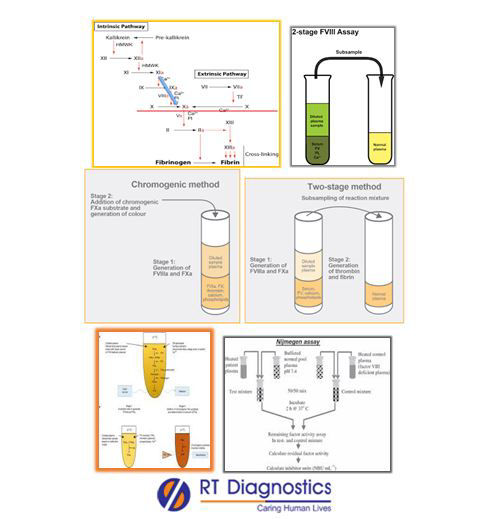Factor VII Activity:
Why Factor VII Activity Test?
CLINICAL INFORMATION
Haemophilia is a disease where blood does not clot properly. Each time a person bleeds, it triggers a series of reactions known as the coagulation cascade to form clots to stop bleeding. Clotting factor tests are also called ‘factor assays tests’ or “screening for factor assays” are required to diagnose bleeding disorders. Other screening tests for detecting clotting disorders include CBC (looks for any abnormalities in RBCs, WBCs and mainly the abnormalities seen platelets and in the platelet count), activated partial thromboplastin time (APTT): This test looks for how long it takes for blood to clot and hence if any of these clotting factors are too low then clotting will take longer time, Prothrombin time (PT): It measures the time taken to form a clot as it measures the clotting ability of factors I, II, V, VII and X and thus if any of these clotting factors are too low then clotting will take longer time, Fibrinogen test is also known as Factor 1 Test: This test is performed when the patient has abnormal PT or APTT test results, clotting factor tests also known as Factor Assays: This test assay helps to screen for diagnosis of bleeding disorder as in case of haemophilia and also to assess its severity (i.e this test helps inaccurate classification of haemophilia) etc. Patients before this test must not have received medications such as Coumadin, warfarin, blood thinners, heparin therapy like LMWH etc, since it will interfere with the true test results. Other factors which may influence the test results are vitamin K deficiency and conditions like liver diseases, lupus anticoagulants etc. Factor VII is a vitamin-K dependent serine protease synthesized in the liver. It is also called as F7, Stable Factor, Extrinsic Factor Protein, Pro-Convertin or Alexander’s Disease (since it was first studied by Dr Alexander) etc. Factor VII is a rare genetic bleeding disorder characterized by either absence or deficiency leading to reduced activity of clotting factor VII (based on their reduced levels and their signs and symptoms also reflect such similar clinical manifestations – from mild, moderate to severe and up to life-threatening complications). These patients manifest with prolonged and uncontrolled bleeding episodes (history). The cause is primarily inherited (autosomal recessive disorder) or due to acquired causes like mutations of F7 gene (since it encodes for factor VII factor). Factor VII gene is located on chromosome 13, very close to the gene for factor X. Factor VII activity test: This test is also known as ‘Factor VII Functional Assay’. This test is performed to detect haemophilia A. It is characterized by deep tissue bleeding, excessive bleeding with trauma, ecchymoses, hemarthoses etc. The Clotting factor VII deficiency is also called pro converting deficiency or prothrombin conversion accelerator deficiency. This test is useful for diagnosing haemophilia A, assessing the impact of liver diseases on hemostasis, investigating a prolonged partial thromboplastin time etc. This is also used for muscle haemorrhage, hematomas, menorrhagia, epistaxis, monitoring coagulation factor replacement therapy etc. Hence positive test results for Factor VII deficiency may be predisposed due to either congenital causes like haemophilia A or due to acquired causes such as vitamin K deficiency, warfarin overdose, liver diseases, consumptive coagulopathy, DIC etc. Other additional tests include stool test (melena, hematochezia) and urinalysis (hematuria), genetic testing etc.

General Instructions:
Sample Requirement: Specimen - Blood sample collected from the vein. Test Preparation: None.
NOTE - Sample for specimen collections may vary based on the patient’s condition/cases according to the patient’s presenting complaints/signs or symptoms:
SPECIMEN REQUIREMENT (Special or Rare Cases) - As instructed and guided by Physician / Clinician / Pathologist / as per Laboratory’s requirements, according to procedures and protocols.
This Multi-Specialty Clinical Referral Laboratory RTDIAGNOSTICS provides precise and accurate tests with an extensive range of testing services to the medical centres to help in the diagnosis and identification of pathology in the test specimens for infectious diseases and also to evaluate the function of organ systems of the patient. It prevents further complications and helps to stabilize and restore health to near normalcy at the earliest without delay.



